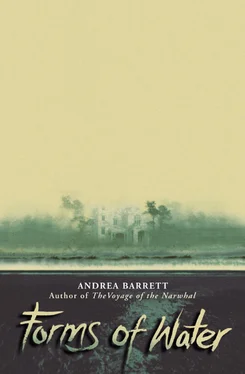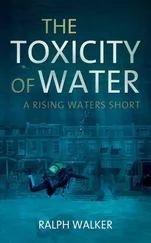“When we were kids,” Brendan said, “your father and I used to walk over the ridge near our place and watch the monks working in the fields below us. All those men in long robes, planting and hoeing, never saying anything — I liked the quiet, I think. I liked the peace. And sometimes we’d stand outside the enclosure walls and listen to them chanting in choir, and I loved that. After the first time I visited there, something happened to me — I can’t explain it. I just knew it was where I wanted to be. Your father thought I was crazy. But your grandmother was pleased. She would have liked a priest in the family, but this was close enough.”
“That’s hard to imagine. Her being pleased about anything.”
“You only knew her after,” Brendan said quietly. “Losing your father really broke her. And to have that come on top of losing her home and all her friends and everyone she’d ever known — she wasn’t sad like that when I was growing up. Neither was your grandfather.”
Henry thought of the briefcase he’d taken from Kitty’s, which was stuffed with all of Da’s newspaper clippings. Da had saved everything he could find about the Paradise Valley and the Stillwater Reservoir, from the first hearings through the River Acts legislation and every step after that.
“Gran and Da used to sit me and Wiloma down and make us look at all this old stuff,” Henry said. “They had programs from the last school graduations. Pictures they’d clipped from the papers, of the building, the evacuations, the engineers and the work crews — Wiloma and I thought they were crazy.”
“Maybe a little crazy,” Brendan agreed. “They’d been through a lot. We didn’t believe it was going to happen, you know. None of us did.”
Henry thought about his grandparents, old and sour and gray. Then he thought about the empty houses of Coreopsis Heights. His grandparents had been dispossessed in the same way, expelled, cast out. He tried to imagine himself in Da’s position, his real home, and not an extra house, taken over not by strangers but by water. His whole life uprooted and one of his daughters dead. His stomach heaved and he pushed the thought away. “So where are we going?” he asked Brendan. “Really, I mean.”
Brendan’s plate was empty. “I’m not sure,” he said. “Wherever we want. The dam, I guess — I’ve never seen it. And we’ll try and find my land, and after that we’ll see. We’ll do whatever we feel like doing.”
“You think the cabin’s still there? On the part that used to belong to my father?”
“Hard to say. Your grandfather sold that thirty years ago.”
Mirella came by with coffee and hovered as if she wanted to talk, but this time Henry had no eyes for her. He was remembering his mother in that cabin, pregnant with Wiloma when she heard the news of Pearl Harbor, still pregnant when her husband went off to the Pacific, then nursing Wiloma while she listened to war news on the radio. She kept a picture pinned over the rocking chair, and he could just remember how she’d held Wiloma in her arms and sat him on the stool at her feet, pointing to the picture and saying, “See Mommy? See Daddy? That’s us, at the Farewell Ball.”
That was the picture he’d tossed in the van, the one he’d taken from Kitty’s closet and glimpsed again when he’d reached into his box for his cap. His mother had told him the story of the ball again and again while his father was away, and his father had told it when he’d returned, and his grandparents had repeated it later. The night had been warm, his mother had said; an April night in 1938. The forsythia was blooming. The valley was partly torn up by then, the dead exhumed and moved and half the living vanished. The huge dam was almost done and the pipes that would carry the water to Boston had all been laid. The Water Commission had closed the post office, the Grange Hall, the churches and the schools; they’d torn down the big hotel and told the farmers not to plant any crops. The fields were weedy and rough.
Mirella was chatting with Brendan now, but Henry ignored her. We dressed up, his mother had said. We wore black; we knew we had to move by June. They had walked quietly, in twos and threes, to the Nipmuck Town Hall where the firemen were hosting the ball. A thousand people came, maybe more, and they danced in dazed circles and drank. When midnight came, the band played “Auld Lang Syne” and the people wept. The towns were dissolved a minute after midnight, by order of the governor, but people danced on in that ghostly place.
Your father was so handsome, his mother had said. So strong. She’d told him how many of the men, Henry’s father among them, had worked clearing brush or digging up graves or driving trucks and dozers for the Commission. It was the Depression, his mother had said. No one had blamed them for taking the work. Henry had been two when his father was called up, and he couldn’t remember that — his first memories of his father came from after the war, when he’d returned to them pale and bony and shaken. He tried to picture his father strong-armed, gathering brush and burning it for the engineers. He tried to picture his tanned face, his bold eyes, the way he’d walked up to Margaret Kelso at the Farewell Ball and whispered into her ear.
The old people had gathered in corners and grown sentimental — that was the part Da and Gran remembered, the part they’d always told him about, but he was more interested in the secret part his mother hinted at. Your father took me outside, she’d said. All the people our age were having a party of their own. In the woods beyond the common they’d built a fire; they’d burned their high-school diplomas, their report cards, the programs and certificates their parents had saved. They drank whiskey the older boys had brought — his father had told him that. They danced their own dances. We made you that night, his mother had said, although it had been years before he’d understood what she’d meant and he’d had to imagine the details for himself after she was dead. How they went into the bushes in pairs and emerged owl-eyed, hours later; how they went somewhere, and his mother got pregnant, and later she and his father married.
A few weeks after the ball, Da and Gran had left the valley and headed for Coreopsis. Frank junior had stayed behind with Margaret and built a cabin on a hill just outside the reservoir, on the piece of land Da had bought years ago for timber. The engineers went to work like ants, razing the remaining buildings so that nothing would contaminate the reservoir. The water had to be clean, his mother had said. For the people in Boston. That was why they’d dug up the cemeteries and moved the bodies; that was why they’d crushed the houses and carted the pieces away, why they’d burned the stubble in the fields. When the hurricane came in September, the wind found nothing to take but trees; afterward, his mother said, the valley looked as if it had been bombed. His father had helped bulldoze the remaining trees and had stripped the hills until they were bare except for the green crests that were supposed to turn into islands. Below these crests, which marked the waterline, the valley was shaved like a skull.
Henry couldn’t remember that sight, but he remembered the waters rising after his father had left for the war. His mother had brought him and Wiloma down the hill weekly, pointing out the slow, inexorable spread of water building up behind the dam. She’d meant, Henry knew, for them to see the horror of it, but he’d been five then, six, seven, and he’d never seen the valley when it had held people and buildings. He’d seen scarred land, rubble, desolation, and the water that rose over the ugliness had seemed like a benediction. It had spread, smooth and pure and serene, until it reached the line where the trees still grew. Then it stopped. It looked like a lake. He had wanted to swim in it, but swimming was forbidden.
Читать дальше












